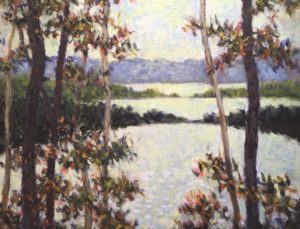Thank you, Peter Watts.
The loss of any artist is a double shock, as it dawns on us what has ended.
Not only will we never again catch his eye, touch his arm, laugh at his joke, but there will no longer be the next image, song, tale, on its way. When an artist’s life’s story closes over, his work’s story closes over as well.

Peter Watts is, and will always be, known for his breathtaking, ephemeral translations of Wellfleet’s marshes, tidelines, skies, and ponds. The landscape was his vehicle, the horizon line his guide.
But Peter’s grail was not landscape, it was luminosity.
He chased and caught it, over and over again in an abstract stream that lasted a lifetime, reducing the solid to the ineffable: light, wind, fog, hue, shadow, contrast, saturating color, pattern, composition, vibration, mood, season, hour.
His paintings paused these flickerings in time, allowing us the opportunity to absorb the spiritual revelation in the fleetingness of “things.”
Because Peter’s comprehension of his surroundings was so profound, it’s still common for any of us who know his work to walk in the back woods and, in a very trippy way, suddenly sense that we are moving within a Watts painting.
I knew Peter a long time. Others knew him longer, better, and with more intimacy or devotion, so I’ll leave the details of his life and times to their telling. I will say he and his tribe of artists and architects, writers, and thinkers who reveled in the Wellfleet of the ’60s, ’70s, and ’80s were a tremendous influence on us newer artists in the community. It was at their happy, endlessly rolling openings, dinners, and infamous cocktail parties that I gained a certain education, often warned by some distinguished personality, drink in hand and far more glamorous than I, that “you can be a fine artist or a commercial artist, but not both.” And “if you’re going to be a true artist, be prepared for a life of great solitude.”
Such predictions torment me to this day, but none of those came from Peter. He seemed to prefer a little gossip to philosophy.

Peter lived a long time. He outlived almost all of his peers. Still, he continued to paint as well as derive tender pleasure from reviewing the long continuum of his past works stacked around his studio almost as if they were new. He knew they were timeless.
In his Wellfleet heyday Peter Watts was to us a walking heartthrob, tall, fleshed out, and, as has been written before, Nordic-ish, hands-down handsome, with deep-set eyes and shaggy blond eyebrows, his humor quiet and sly.
In his last couple of years, age and illness shrank Peter’s body around his long bones. It was as if what was left of his own energy meant to consume him until nothing was left but the luminous.
My admiration for Peter the artist and love for Peter the man is without end. I thank his gift, his beauty, his influence, his place in Wellfleet history, and believe his artist’s soul finally got to experience Leonard Cohen’s holy prediction about death:
“You lose your grip,
And then you slip
Into the Masterpiece.”



